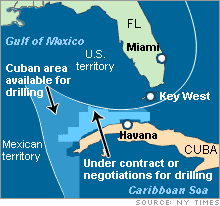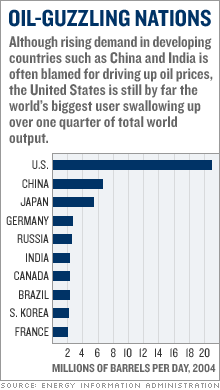On the poor environment which is essentially us and everything The current administration with all its deep rooted connections to the energy/fuel fields is putting a royal hurting on this planet.
NOTE: Skip N is not allowed to bring up party affiliations per order of sanity.
~~~~~~~~~~~~~~~~~~~~~~~~~~~~~~~~~~~~~~~~~~~~~~~~~~ ~~~~~~~~~~~~~~~~~~~
China, Cuba reported in Gulf oil partnership
U.S. firms stand by, prohibited from bidding on contracts; lawmakers propose opening up U.S. coast for drilling.
May 9, 2006: 10:12 AM EDT
NEW YORK (CNNMoney.com) - Plans for foreign oil companies, some from India and China, to drill off the cost of Cuba are prompting calls from lawmakers to ease environmental restrictions that prohibit coastal drilling in most of the U.S., according to a report Tuesday.
At a time of rising soaring gasoline prices caused partly by a lack of supply, legislators are fuming that Cuba is opening up its continental shelf for oil and gas exploration while most of the U.S. continental shelf outside the Gulf of Mexico, which extends 200 miles from shore, has been off limits for drilling since the early 1980s, the
New York Times reported.
 Firms from China and India will be drilling for oil off the coast of Cuba, but U.S. companies are prohibited from bidding on the contracts, according to a recent report.
Firms from China and India will be drilling for oil off the coast of Cuba, but U.S. companies are prohibited from bidding on the contracts, according to a recent report.
Adding insult to injury, the
Times said U.S. firms were invited to bid on the Cuban contracts, but were barred by the U.S. government due to the country's longstanding economic embargo of communist Cuba.
"Red China should not be left to drill for oil within spitting distance of our shores without competition from U.S. industries," Sen. Larry Craig, Republican of Idaho, told the
Times.
Firms from Canada and Spain will also drill off the Cuban coast, the article said
Craig is introducing a bill to exempt U.S. oil firms from the embargo, much as food and drug firms are, according to the article.
There are also several bills moving through Congress aimed at opening up areas more areas of the U.S. to oil and gas exploration, including coastal waters and Alaska's Arctic National Wildlife Refuge.
Supporters of the bills, including the oil industry, say it would help bring down oil and gas prices and decrease the country's reliance on oil imports from the volatile Middle East.
Gasoline prices have soared 33 percent over the last year, while the price of crude oil has tripled since 2002.
But critics of more drilling say the energy obtained, which they say would be minimal and wouldn't bring down prices that much, isn't worth the environmental risks. They also say more drilling for a finite resource does nothing to promote long term conservation solutions.
Most coastal states also oppose offshore drilling, fearing unsightly rigs and oil spills will hurt their tourism industries.
The United States Geological Survey estimates the Cuban deal involves 4.6 billion barrels of oil and 9.8 trillion cubic feet of natural gas, according to the
Times. The paper said that's enough oil and gas to power the U.S. for a few months.
The paper also cited an Interior Department study that said the U.S. continental shelf contained 115 billion barrels of oil and 633 trillion cubic feet of natural gas. That would be enough oil to satisfy U.S. demand, at current consumption levels, for 16 years and enough natural gas for 25 years, according to the
Times.
__________________



